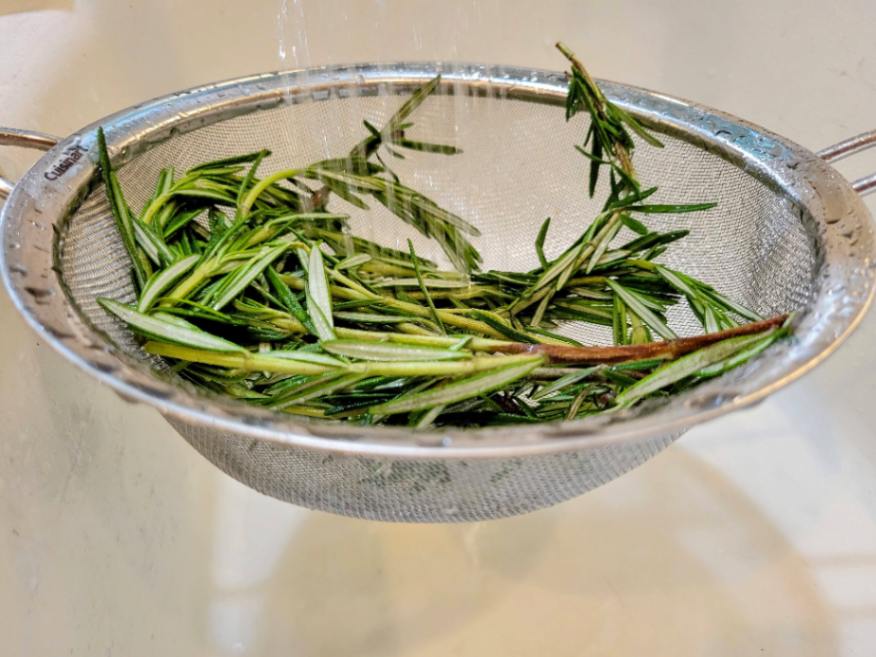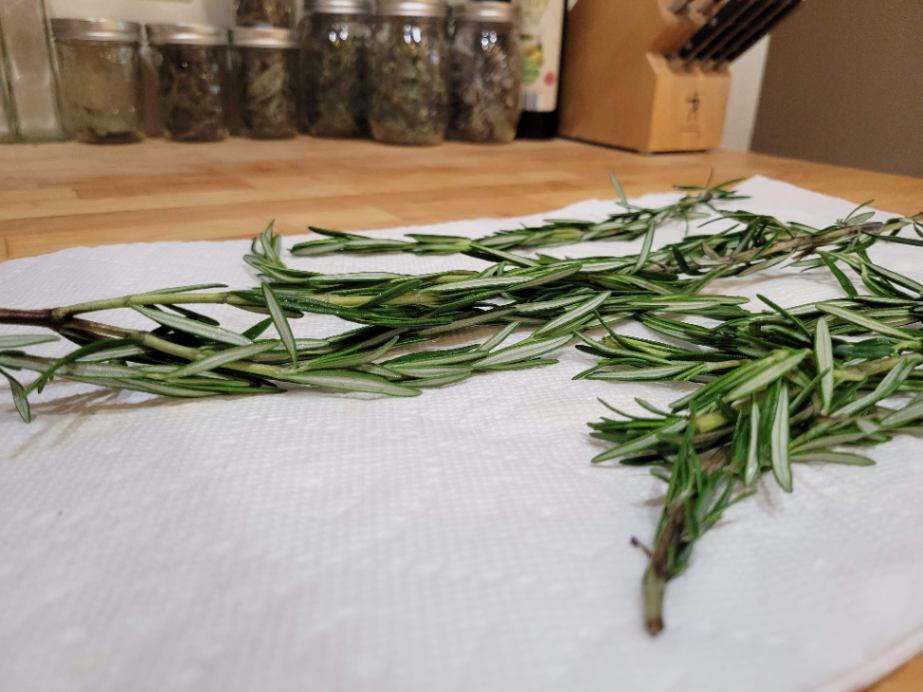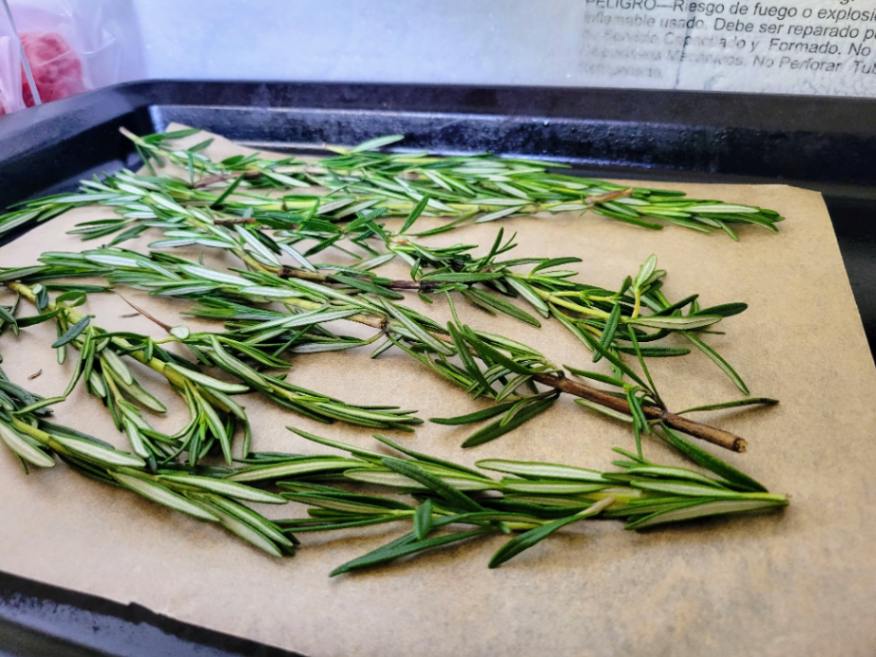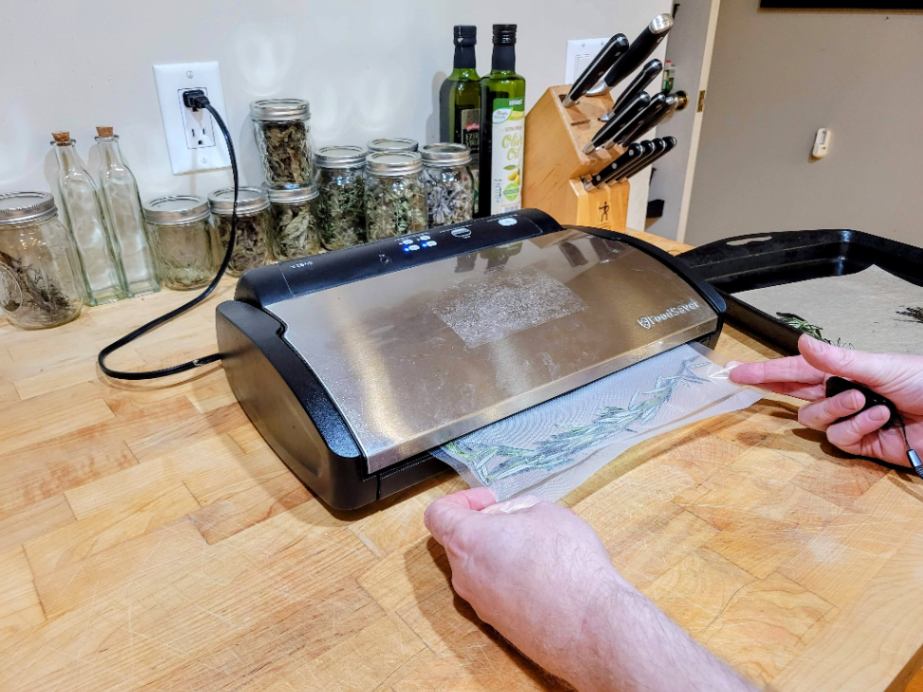This post may contain affiliate links which means I may receive a commission for purchases made through links. I only recommend products that I have personally used. As an Amazon Associate I earn from qualifying purchases. Learn more on my Private Policy page.

After a successful rosemary harvest from your herb garden, you must determine the best method for preserving it for your future culinary endeavors.
Freezing rosemary is a great way to preserve this hardy herb’s fresh taste and color, particularly when using it in dishes that would benefit from using fresh rosemary. For optimal freshness, use frozen rosemary within 4 to 6 months. Drying rosemary is the preferred method for those seeking a longer shelf life.
Hardy herbs like rosemary tend to fare better than more tender herbs when using the flash-freezing method. Continue reading to learn how to flash-freeze rosemary step-by-step.
Table of Contents
See my Complete Guide to Rosemary for a deeper dive into this aromatic herb.
1) Harvest Fresh Rosemary from Your Garden
The quality of your herbs is a primary factor to consider when preserving herbs for culinary use after the growing season has ended. Harvest healthy rosemary sprigs that are 6-8″ long for freezing.
2) Wash and Dry Rosemary Sprigs
Wash your rosemary sprigs with cold water to remove dirt, debris, or insects from your freshly harvested herbs. Remove excess water by patting it dry with paper towels or by running it through a salad spinner.

Let your rosemary dry off completely before freezing. You want to ensure no moisture is present when freezing, as ice crystals can damage the cell structure of your herbs during freezing.

3) Remove Rosemary Leaves from Stems and Chop Them (Optional)
If desired, you can remove and chop up the rosemary leaves before freezing.
If you plan to primarily use rosemary for soups, stews, or sauces, it’s easiest to freeze full sprigs and toss them into your pot when cooking. No thawing is necessary; the rosemary leaves will come off the stems during cooking. Just make sure to remove the stems before serving.

If you prefer a finer rosemary consistency, especially when baking it or creating dry rubs for roasting meats, the ideal approach is to remove the leaves and finely chop them to your preferred size before freezing.
4) Flash Freeze Rosemary for 2 Hours
Place whole sprigs or chopped leaves of rosemary on parchment paper on a baking sheet. Allow adequate spacing of your rosemary to ensure it freezes evenly. Place the baking sheet in a freezer for 1 1/2 to 2 hours or until rosemary is completely frozen.

Don’t leave the cookie sheet in your freezer overnight, as over-freezing the exposed rosemary could leave to freezer burn.
5) Portion and Pack Rosemary
Remove the baking sheet from the freezer once the rosemary has frozen. Measure out the rosemary into portions appropriate to how you intend to cook with it.
Pack your portions of rosemary into freezer bags or vacuum-sealed bags for longer-term storage. Remove as much air as possible to prevent freezer burn.

Vacuum sealers can be invaluable when it comes to extending the shelf life of your herbs. In my kitchen, I rely heavily on my FoodSaver sealing machine. Some affordable vacuum sealer models can be found by following the links below:
If you don’t have access to a vacuum sealer, you can still use freezer bags as a practical alternative for storing your rosemary for freezing. Just make sure to minimize the amount of excess air inside the bag before sealing it.
6) Label and Date Rosemary Bags
Make sure to label and date your rosemary bags for easy identification. It’s important to know when you’re freezing your herbs to ensure it’s used within an appropriate time frame. This helps to ensure you’re using your herbs while they are still at their peak quality.

7) Store in Freezer for Up to One Year
Store your bags of rosemary in your freezer. When properly vacuum-sealed and stored, rosemary can last up to one year in the freezer. For the best flavor and overall herb quality, it’s best to use it within the first 4-6 months after freezing.
8) Use Your Frozen Rosemary in Cooking
There is no need to thaw your frozen rosemary before cooking with it. If you have frozen whole rosemary sprigs, toss a sprig or two into soups, stews, or pasta sauces. Just make sure to remove the stems before serving.
Frozen rosemary can also be used in dishes such as roasted vegetables or potatoes, in a marinade or dry rub for chicken or lamb dishes, and even in rosemary breads.
Consider Freezing Rosemary in Ice Cube Trays
You can also prepare your rosemary for future use by chopping it and freezing it in ice cube trays. Before you go ahead with this method, take a moment to think about how you intend to use your rosemary. If you plan to use it in dry rubs, freezing it in ice cube trays wouldn’t be the best approach.

For more information, see my article on How to Freeze Herbs in Ice Cube Trays and find out if it’s better to freeze herbs in oil or water.
Is It Better to Freeze or Dry Rosemary?
Whether to freeze or dry your rosemary depends on how you intend to use it.
If you want a long shelf life and intense flavor, then drying rosemary is the best way to go. Dried rosemary can be stored for up to a year without losing much flavor. To preserve rosemary’s freshness in recipes that would benefit from the taste and texture of fresh rosemary, freezing works best.
The following table illustrates the benefits of either freezing or drying rosemary. The ideal preservation method depends on how you intend to cook with your rosemary.
| Aspect | Freezing Rosemary | Drying Rosemary |
|---|---|---|
| Flavor and Aroma | Retains freshness and aroma | Concentrated, intense flavor |
| Color Retention | Retains vibrant green color | Fades to a darker hue |
| Shelf Life | Shorter shelf life (several months) | Longer shelf life (several months to a year) |
| Ideal Uses | Suitable for recipes where fresh flavor is preferred | Great for long-term storage and dishes requiring concentrated flavor |
Conclusion
Harvesting and preserving fresh rosemary from your garden is a simple process that can enhance your culinary creations long after the growing season has ended.
When properly stored in the freezer, your rosemary can maintain its quality for up to a year, with the best flavor and overall herb quality retained within the first 4-6 months.
Whether you choose to freeze or dry your rosemary depends on your intended use, but both methods provide convenient options for enhancing your dishes with this aromatic herb. Preserving rosemary lets you enjoy the delightful flavor of this homegrown herb throughout the year.
Last Updated on 25 October 2023 by Bob Lee

